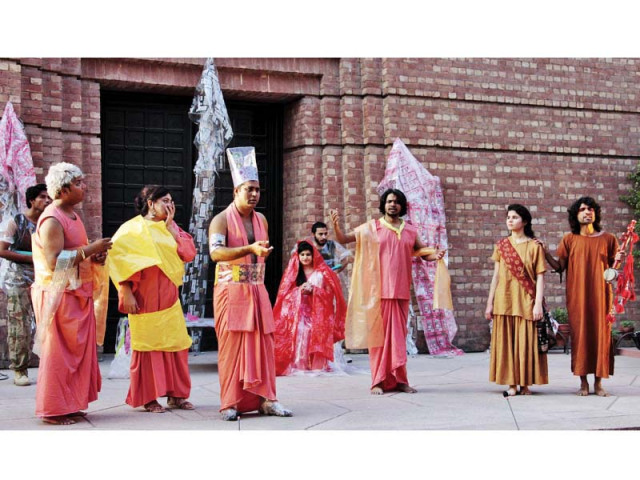Faiz festival: Tribute paid to Sibte Hassan
Speaker applauds his writings that were relevant to changing times

Artists perform a stage play during the Faiz festival at Alhamra Art Center in the city. PHOTO: ONLINE
While speaking on the occasion, Progressive Writers Association General Secretary Syed Jaffar Ahmed said Hassan stood against fundamentalism, which was the reason he was popular in the progressive circles of Pakistan and also among the youth.
“At present, our society is going through intellectual decadence where retrogressive forces enjoy hegemony and the state is bent upon going back to medieval ages,” he added. “[In such times] the thoughts of Hassan could guide us in a better manner.”
The session was moderated by Government College University Lahore Department of History Head Dr Tahir Kamran.
Flowing pen
Jaffar said Hassan’s thought evolved with the passage of time and his writings were an example of this. Maazi ka Mazar was written in 1960s, Pakistan Main Tehzeeb Ka Irtaqa in 1975 and Naveed-e-Fikar was written during the regime of General Ziaul Haq.
In Pakistan Main Tehzeeb ka Irtiqa, Hassan wrote on the history of Pakistani people and the country’s material and economic basis. It was unlike the history that eulogises rulers and kings.
Hassan argued against the approach taken by historians that the occurrence of Partition was the result of a decision Muslims made centuries ago. He instead believed the movement was wrong altogether. He also discussed geographical history of the constituents of Pakistan. It was an effort to give a progressive narrative to the debate on the identity of Pakistan, that was a hot issue after the debacle of East Pakistan in 1971.
Naveed-e-Fikar was written during the rule of Zia. In this book, Hassan analysed historical facts and material conditions of the society, advocating the need of democracy in Pakistan. However, he believed secularism was the basis of democracy.
The scholar supported secularism, believing it to be the essence of the democracy.
Moreover, Hassan argued that state was not a subject of religion – the sole purpose of religion was to reform a society.
The scholar was also of the view that democracy could not nurture in a society like Pakistan’s where religious scholars remained in perpetual sectarian strife, not playing their role for reformation. Hassan also considered feudalism to be the biggest hurdle in the way of democracy, believing Muslim societies were authoritative where democratic and progressive voice was curbed by feudalism.
Published in The Express Tribune, November 20th, 2016.


















COMMENTS
Comments are moderated and generally will be posted if they are on-topic and not abusive.
For more information, please see our Comments FAQ